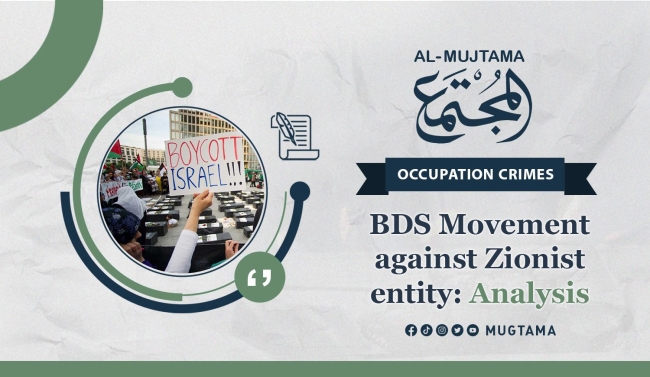BDS Movement against Zionist entity: Analysis Featured
The BDS (Boycott, Divestment, and Sanctions) movement against the Zionist entity is a global campaign aimed at pressuring the Zionist entity to change its policies towards Palestinians living under occupation. Advocates argue that BDS is a nonviolent means to promote justice, equality, and human rights. However, the movement has been met with significant controversy, with critics accusing it of anti-Semitism and de-legitimization of the Zionist entity. We will explore the BDS movement's objectives, tactics, challenges, its impact on the Zionist-Palestinian conflict, and the wider global political landscape.
Objectives and Tactics of the BDS Movement:
The primary objective of the BDS movement is to encourage the Zionist entity to comply with international law by ending the occupation of Palestinian territories, granting equal rights to Palestinian citizens of the Zionist entity, and recognizing the rights of Palestinian refugees. To achieve this, BDS utilizes various tactics, including promoting boycotts of Israeli goods, encouraging divestment from companies complicit in the occupation, and calling for sanctions against the Zionist entity. These strategies aim to exert economic and political pressure on Israel to bring about policy changes and promote Palestinian rights.
Controversy Surrounding BDS:
The BDS movement has been a subject of heated debates and controversy. Critics argue that the movement unfairly singles out the Zionist entity for condemnation while ignoring human rights issues in other parts of the world. Accusations of anti-Semitism have also been raised, claiming that BDS campaigns often blur the lines between critique of Zionist policies and anti-Jewish sentiment, leading to a toxic environment on college campuses and beyond. These criticisms have deepened divisions, making a fair evaluation of the movement's merits challenging.
Impact on the Zionist-Palestinian Conflict:
Assessing the actual impact of the BDS movement on the Zionist-Palestinian conflict is complex. Proponents argue that BDS has raised awareness about the occupation and the denial of Palestinian rights, effectively mobilizing grassroots support for Palestinians and increasing international pressure on the Zionist entity to change its policies. However, some critics claim that BDS has had minimal economic impact on the Zionist entity, while others argue that it has contributed to a hardening of positions and hindered dialogue and constructive engagement between Israelis and Palestinians.
Influence on Global Political Landscape:
The BDS movement has not only affected the Zionist-Palestinian conflict but has also sparked significant discussions and actions within the global political landscape. Several prominent figures, including academics, artists, and even some government entities, have endorsed or embraced components of the BDS movement. This has prompted counter-movements and legislation seeking to criminalize BDS activities in certain countries. Consequently, the BDS movement has become an integral part of broader debates on human rights, free speech, and the Palestinian cause, challenging long-standing narratives and positions.
Challenges and Future Prospects:
The BDS movement faces several challenges, including maintaining a unified message, addressing accusations of anti-Semitism, and effectively expanding its influence beyond its traditional support base. Moreover, the movement experiences difficulties in achieving tangible goals, as the Zionist government and its allies have actively opposed BDS efforts through legal means and counter-campaigns. However, the continuing growth of BDS has demonstrated its resilience, shining a spotlight on Palestinian rights, and maintaining international attention on the Israeli-Palestinian conflict.
The BDS movement has emerged as a significant force within the Israeli-Palestinian conflict, generating both support and criticism on a global scale. The movement's objectives, tactics, and challenges present a nuanced and complex situation that requires careful analysis and understanding. It is crucial to differentiate legitimate critique of Zionist policies from anti-Semitism while considering the broader context of human rights, international law, and political dynamics in the region. Ultimately, an inclusive and constructive approach remains vital to finding a just and sustainable solution to the Zionist-Palestinian conflict.


